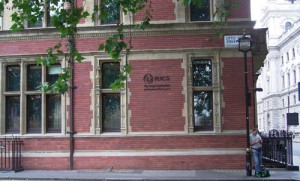 Track2Realty: The Royal Institution of Chartered Surveyors (RICS), the world’s leading professional qualification and standard setting body in land, property and construction sector and Amity University have established the RICS School of Built Environment, Amity University at Noida campus, to address the shortage of skilled professionals in the sector.
Track2Realty: The Royal Institution of Chartered Surveyors (RICS), the world’s leading professional qualification and standard setting body in land, property and construction sector and Amity University have established the RICS School of Built Environment, Amity University at Noida campus, to address the shortage of skilled professionals in the sector.
Envisioned as a modern world class institution, the School of Built Environment will offer a range of academic degree programs, including 3 year full time BBA in Real Estate and Urban Infrastructure. 2 year full time MBA in Real Estate and Urban Infrastructure (with specialization in Investment Finance or Marketing) and 2 year full time MBA in Construction Project Management.
The School will also offer Management Development Programs to meet the training and development requirements of existing professionals in sector.
This industry led academic initiative is supported by the Ministry of Urban Development, where the School aims to bridge the professional skills gap in real estate, construction, infrastructure and associated services – collectively termed as ‘built environment’, by delivering ‘industry ready’ professionals from the day students complete their education and step into the industry.
RICS also announced the appointment of Prof. K.T. Ravindran as Dean of the RICS School of Built Environment, Amity University. An internationally acclaimed academician, he has over 30 years experience in academia, and was the former Dean of the School of Planning and Architecture and the Chairman of the Delhi Urban Arts Commission. He is also the founder and President of the Institute of Urban Designers – India, which is a professional association of qualified urban designers.
Globally, the built environment sector accounts for 10% of the work force, 70% of wealth, 60% of all utilized materials, 40% of carbon emissions and 60% of energy utilization. In India, the sector accounts for nearly 17.5% of the GDP, second only to agriculture and is the second largest employer with over 50 million people working in built environment.
Inaugurating the RICS School of Built Environment, Amity University, Kamal Nath, Union Minister of Urban Development, Government of India said, “I see this endeavour between RICS and Amity University in setting up the School of Built Environment as a first-of-its-kind initiative that will lay the foundation to setting new benchmarks that other institutions will subsequently try and emulate. The challenges of urbanization in India are already immense. India has a very young demographic profile that’s extremely mobile and we’re already seeing small towns becoming the hub of economic activity.”
“This is probably the largest aspirational society on the planet with growing disposable incomes – moving from the economics of sustenance to the economics of gratification and we see this reflected in the built environment domain as well. One of the biggest challenges facing the real-estate, construction and infrastructure sectors is that of good human resources. The RICS School of Built Environment, Amity University will therefore enable quality and relevant education for young professionals entering this sector. I also look forward to the School of Built Environment creating ‘next practices’ which in turn will lead to ‘best practices’ for the industry. The government will be happy to assist this partnership in any way possible,” Kamal Nath added.
Commenting on the importance of this initiative, Sachin Sandhir, MD-RICS South Asia said, “Built environment is severely being impacted by a demand-supply mismatch of professionals. The projected shortage of various core and specialized professionals to the tune of 44 million is a cause for significant concern, as it threatens the sustainability of high growth sectors of real-estate, construction and infrastructure, which contribute significantly to the nation’s economic development.”
“Considering the dearth of quality talent within built environment stems from the absence of specialized education in the sector, we are extremely glad to have set up the RICS School of Built Environment, Amity University as a world-class, industry led academic institution that will help bridge the skills gap in India by equipping 15,000-20,000 professionals over the next three to five years, thereby ensuring that the growing demand for quality real estate, construction and infrastructure in the country are adequately met, said Sachin.”
According to Atul Chauhan, Chancellor, Amity University, “With the establishment of the RICS School of Built Environment, Amity University has enhanced its commitment to provide world class education across disciplines within the real estate, construction and infrastructure sectors. India is one of the fastest growing economies of the world, where new townships and infrastructure development are rapidly changing the face of the country. We see this initiative as an opportunity to deliver quality education and serve as a hub for research and develop technical standards and best practices in the sector and ensuring that in the times to come ‘built environment’ will be viewed as a ‘career of choice’ by all aspiring professionals.”
Echoing the sentiments of the others, Prof. K.T. Ravindran, Dean, RICS School of Built Environment, Amity University said, “Although the real estate and construction sectors are key contributors to the economy, there is a complete vacuum of education and training options available for professionals to enhance and hone their skills. The School of Built Environment has been launched to provide students with a strong foundation for a specialized career in this fast growing sector. Top-of-the-line faculty sourced from around the world in a campus comparable to the best anywhere, along with an innovatively designed curriculum will ensure that the graduates passing out from the School are wholesome, employment-ready professionals that meet the changing needs of the industry.”





